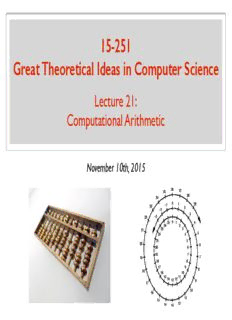
Computational Arithmetic PDF
Preview Computational Arithmetic
15-251 Great Theoretical Ideas in Computer Science Lecture 21: Computational Arithmetic November 10th, 2015 This week Computational arithmetic (in particular, modular arithmetic) + Cryptography (in particular, “public-key” cryptography) Main goal of this lecture Goal: Understanding modular arithmetic: theory + algorithms Why: 1. When we do addition or multiplication, the universe is infinite (e.g. , , .) Z Q R Sometimes we prefer to restrict ourselves to a finite universe (e.g. the modular universe). 2. Some hard-to-do arithmetic operations in or Z Q is easy in the modular universe. 3. Some easy-to-do arithmetic operations in or Z Q seem to be hard in the modular universe. And this is great for cryptography applications! Main goal of this lecture Modular Universe - How to view the elements of the universe? - How to do basic operations: > addition > subtraction theory > multiplication + > division algorithms > exponentiation (efficient (?)) > taking roots > logarithm The plan Start with algorithms on good old integers. Then move to the modular universe. Integers Algorithms on numbers involve BIG numbers. 3618502788666131106986593281521497110455743021169260358536775932020762686101 7237846234873269807102970128874356021481964232857782295671675021393065473695 3943653222082116941587830769649826310589717739181525033220266350650989268038 3194839273881505432422077179121838888281996148408052302196889866637200606252 6501310964926475205090003984176122058711164567946559044971683604424076996342 7183046544798021168297013490774140090476348290671822743961203698142307099664 3455133414637616824423860107889741058131271306226214208636008224651510961018 9789006815067664901594246966730927620844732714004599013904409378141724958467 7228950143608277369974692883195684314361862929679227167524851316077587207648 7845058367231603173079817471417519051357029671991152963580412838184841733782 Integers B = 5693030020523999993479642904621911725098567020556258102766251487234031094429 75 B 5.7 10 ( 5.7 quattorvigintillion ) ⇡ ⇥ B is roughly the number of atoms in the universe or the age of the universe in Planck time units. Definition: len(B) = # bits to write B log B 2 ⇡ For B = 5693030020523999993479642904621911725098567020556258102766251487234031094429 len(B) = 251 (for crypto purposes, this is way too small) Integers: Arithmetic In general, arithmetic on numbers is not free! Think of algorithms as performing string-manipulation. Think of adding two numbers up yourself. (the longer the numbers, the longer it will take) 36185027886661311069865932815214971104 + 65743021169260358536775932020762686101 101928049055921669606641864835977657205 The number of steps is measured with respect to the length of the input numbers. Integers: Addition 36185027886661311069865932815214971104 A + 65743021169260358536775932020762686101 B 101928049055921669606641864835977657205 C Grade school addition is linear time: if len(A), len(B) n number of steps to produce C is O(n) Integers: Multiplication 36185027886661311069865932815214971104 A x 5932020762686101 B XXXXXXXXXXXXXXXXXXXXXXXXXXXXXXXXXXXXXX XXXXXXXXXXXXXXXXXXXXXXXXXXXXXXXXXXXXXX XXXXXXXXXXXXXXXXXXXXXXXXXXXXXXXXXXXXXX XXXXXXXXXXXXXXXXXXXXXXXXXXXXXXXXXXXXXX XXXXXXXXXXXXXXXXXXXXXXXXXXXXXXXXXXXXXX XXXXXXXXXXXXXXXXXXXXXXXXXXXXXXXXXXXXXX XXXXXXXXXXXXXXXXXXXXXXXXXXXXXXXXXXXXXX XXXXXXXXXXXXXXXXXXXXXXXXXXXXXXXXXXXXXX XXXXXXXXXXXXXXXXXXXXXXXXXXXXXXXXXXXXXX XXXXXXXXXXXXXXXXXXXXXXXXXXXXXXXXXXXXXX XXXXXXXXXXXXXXXXXXXXXXXXXXXXXXXXXXXXXX XXXXXXXXXXXXXXXXXXXXXXXXXXXXXXXXXXXXXX XXXXXXXXXXXXXXXXXXXXXXXXXXXXXXXXXXXXXX XXXXXXXXXXXXXXXXXXXXXXXXXXXXXXXXXXXXXX XXXXXXXXXXXXXXXXXXXXXXXXXXXXXXXXXXXXXX XXXXXXXXXXXXXXXXXXXXXXXXXXXXXXXXXXXXXX 214650336722050463946651358202698404452609868137425504 C # steps: O(len(A) len(B)) · 2 = O(n ) if len(A), len(B) n
Description: